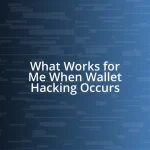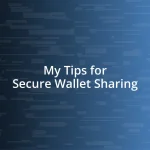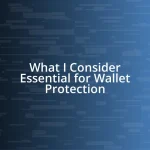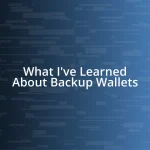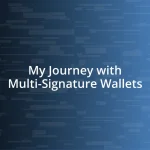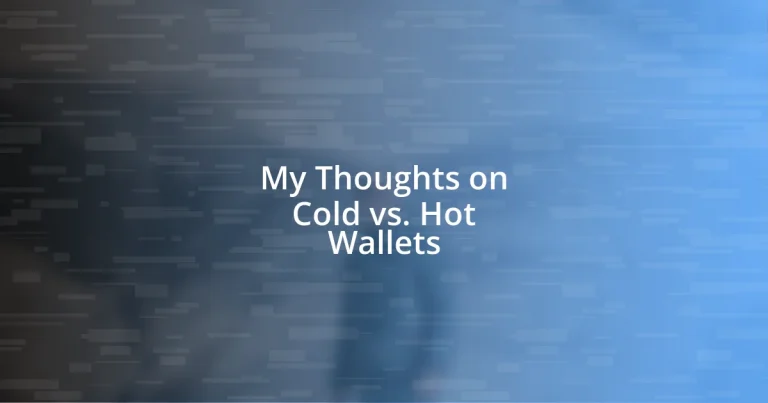Key takeaways:
- Cold wallets provide high security for long-term asset storage by keeping private keys offline, making them immune to online threats.
- Hot wallets offer convenience for quick transactions and real-time trading but expose users to cyber threats, requiring a careful balance of use.
- Prioritizing wallet security involves using strong passwords, enabling two-factor authentication, keeping software updated, and being vigilant against phishing attacks.

Introduction to Wallets
Wallets play a crucial role in the world of cryptocurrency, serving as the bridge between the digital realm and your financial assets. Imagine your wallet as a secure vault – it’s where you store your precious digital currency, ensuring that only you have access to it. Have you ever wondered how the different types of wallets can impact your security and convenience?
I remember when I first dipped my toes into the crypto space, feeling a bit overwhelmed by the choice of wallets available. It felt like standing in a candy store with so many options, yet I knew I had to be careful about what I picked. Understanding the difference between hot and cold wallets made my experience much easier while giving me peace of mind.
Choosing a wallet isn’t just a technical decision; it’s an emotional one too. We all want security for our hard-earned assets, but we also seek the convenience of easy access for daily transactions. The conversations I’ve had with other crypto enthusiasts often touch on this balance—how do you secure your digital fortune while still enjoying the fruits of your investments? It’s a fascinating topic, and I can’t wait to explore it further.

Understanding Cold Wallets
Understanding cold wallets is essential for those looking to secure their cryptocurrency investments. A cold wallet is a tool that stores your digital assets offline, away from the prying eyes of hackers. When I first learned about cold wallets, it felt like discovering a hidden treasure chest where my crypto could rest safely, protected from the chaos of the online world.
What I find particularly fascinating about cold wallets is their level of security. They’re often referred to as hardware wallets or paper wallets, and they keep your private keys—essentially the keys to your vault—completely offline. I remember setting up my first hardware wallet and experiencing that moment of relief, knowing that my cryptocurrency was now shielded from any online threats.
Cold wallets may not offer the same quick access as their hot counterparts; however, they provide an unparalleled sense of security for long-term storage. I often recommend them to friends who are serious about their investments. It’s comforting to know that, even if the online world becomes unpredictable, my assets remain secured, resting safely in my own personal vault.
| Aspect | Cold Wallets |
|---|---|
| Security Level | High |
| Access Speed | Slower |
| Purpose | Long-term storage |
| Example | Hardware wallet, paper wallet |
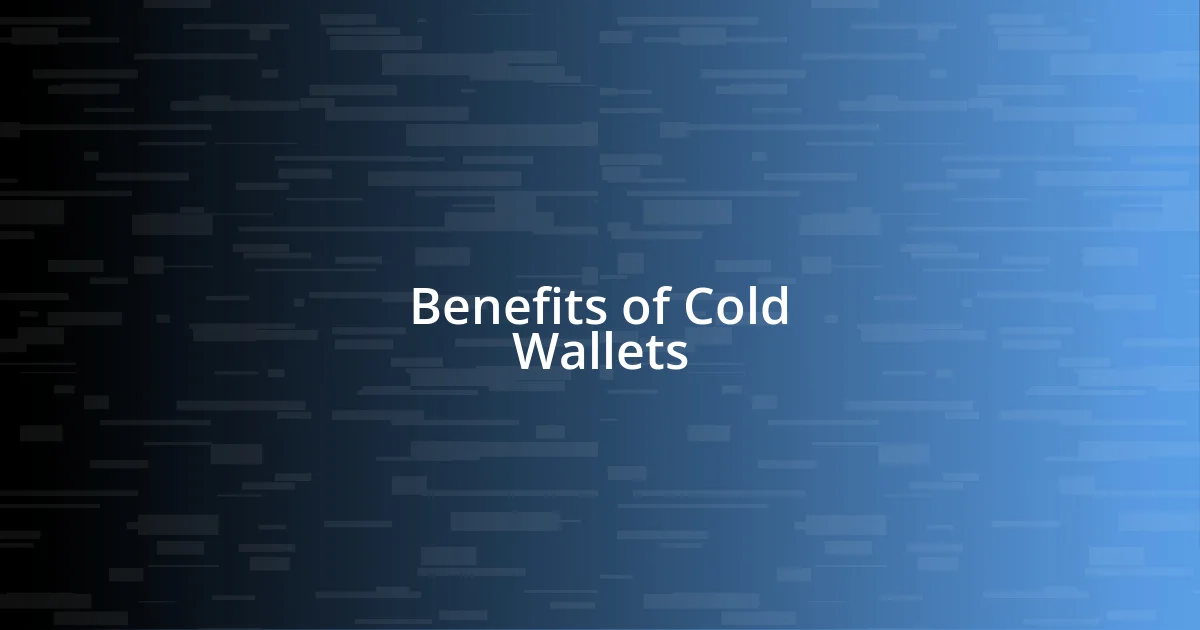
Benefits of Cold Wallets
Cold wallets offer impressive benefits, especially for those serious about safeguarding their cryptocurrency. One key advantage is their outstanding security. By keeping your assets offline, you’re less susceptible to online threats like hacking or phishing attacks. I remember chatting with a friend who had a bad experience with a compromised hot wallet, and his story only reinforced my belief in the added layer of protection that cold wallets provide.
Here are some notable benefits of cold wallets:
- Enhanced Security: Cold wallets store your private keys offline, making them immune to online attacks.
- Long-Term Storage: Ideal for holding assets you don’t plan to trade frequently, they provide peace of mind for your long-term investments.
- Protection from Human Error: With no internet connection, the risk of making accidental transactions is minimized.
- Asset Ownership: You truly own your keys and cryptocurrency, which is empowering for me as an investor.
- Multiple Storage Options: From hardware devices to paper wallets, the variety gives you options to suit your comfort and needs.
The advantage of cold wallets goes beyond just security; it’s about having control over your investments and being able to sleep soundly at night knowing your crypto is safe from the internet’s wild world.

Exploring Hot Wallets
Hot wallets are a fascinating aspect of the cryptocurrency world, offering a balance between accessibility and security. Personally, I find them incredibly convenient for daily transactions. When I first started buying and selling crypto, my hot wallet made the process seamless. Imagine being able to send or receive digital coins in seconds—it’s exhilarating! However, with that speed comes the risk of potential exposure to cyber threats, a reality I’ve had to navigate carefully.
Exploring the functionality of hot wallets reveals some intriguing features. They are often web-based or mobile applications, designed for quick access to funds. I remember the sheer panic I felt when I misplaced my phone—a device that housed my hot wallet. Even though I had recovery measures in place, it reminded me just how pivotal these wallets are to our everyday interactions in the crypto space. The convenience is hard to overlook, but I often ask myself: is that convenience worth the risk?
While hot wallets provide an exceptional amount of flexibility, they’re not without their downsides. I’ve seen friends lose substantial amounts due to phishing scams targeting their hot wallets. Reflecting on these experiences has made me more cautious. They are perfect for active trading or frequent transactions, but I believe it’s essential to strike a balance and ensure you have a backup strategy for securing your assets. How about you? Do you feel comfortable balancing convenience and security in your crypto journey?
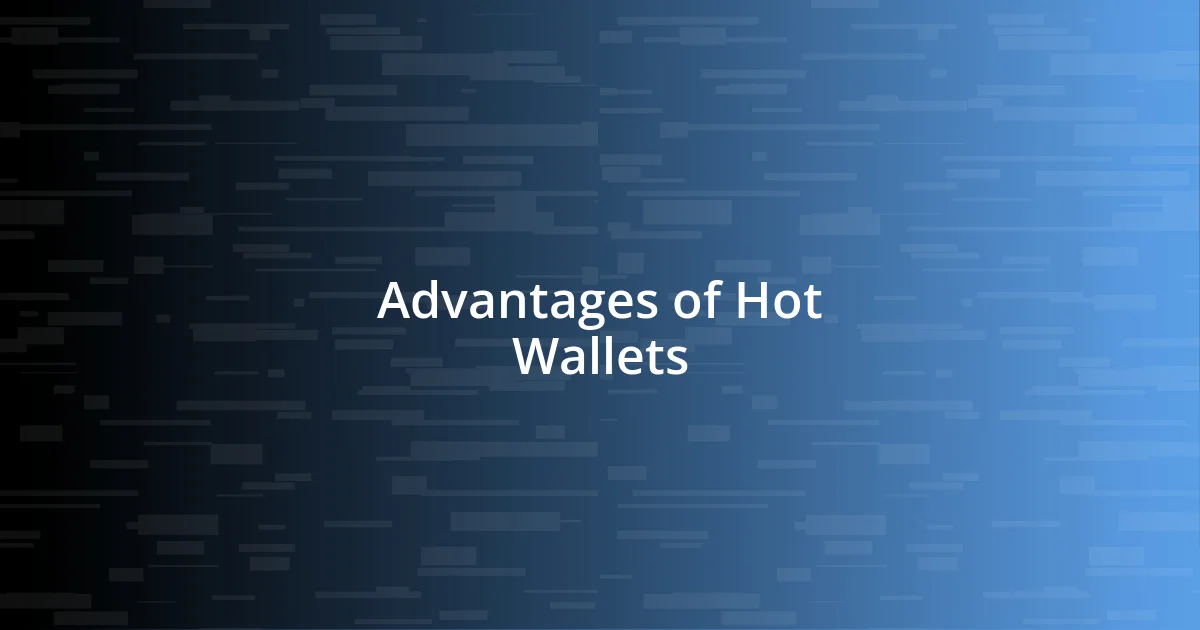
Advantages of Hot Wallets
Hot wallets come with significant advantages, primarily their ease of use. I vividly remember the excitement of making my first trade; it was so easy to execute right from my smartphone. The user-friendly interfaces make it straightforward for anyone to dive into the crypto world. Have you ever been in a situation where you needed to send funds quickly? I recall a friend who needed to settle a bill urgently and completed the transaction in just moments using her hot wallet.
Another compelling benefit is the constant connectivity that hot wallets offer. This feature allows users to monitor market fluctuations and execute trades at a moment’s notice. There were times when I felt the adrenaline rush while tracking crypto prices in real-time, quickly responding to market changes. That kind of immediacy is hard to replicate with a cold wallet. Isn’t it refreshing to think you can take advantage of market opportunities without delay?
Additionally, hot wallets often provide easier integration with various exchanges and services. I can’t forget the convenience of linking my wallet to a decentralized application to engage in DeFi activities. It opened a whole new realm of possibilities for managing my assets. While I completely understand the security concerns, the ability to access funds and engage in trading on the go makes hot wallets a preferred choice for many of us who value speed and flexibility in our crypto transactions.
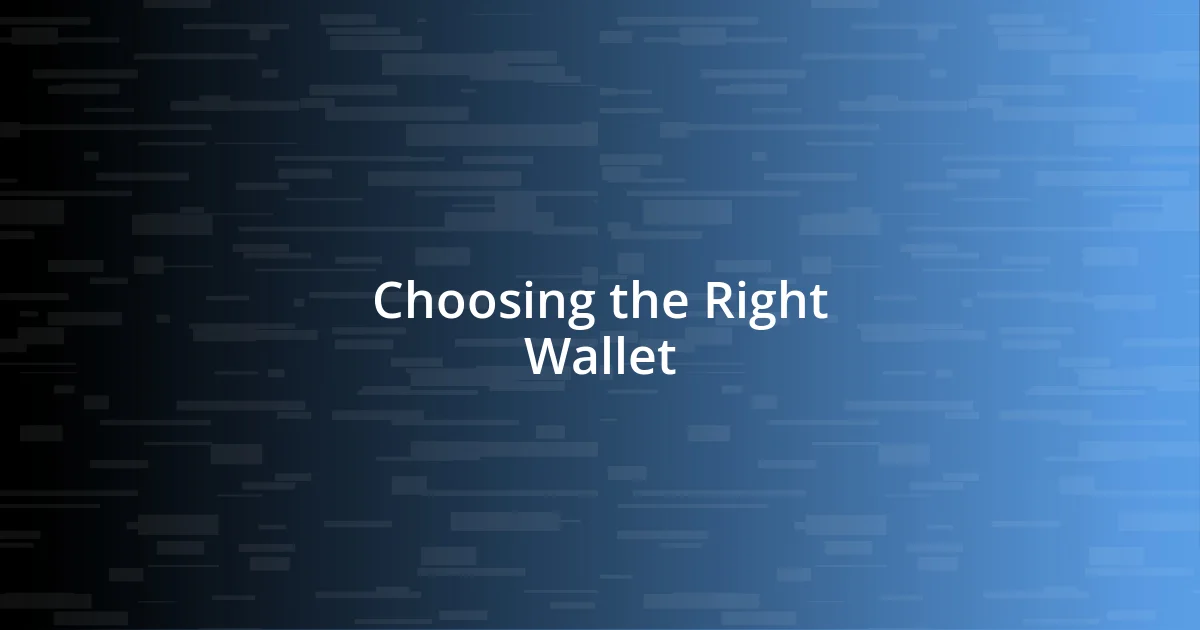
Choosing the Right Wallet
Choosing the right wallet hinges on your individual needs and preferences. When I first pondered this decision, I realized that my lifestyle as an active trader greatly influenced my choice. If you’re someone who frequently buys and sells, a hot wallet might seem like a natural fit for convenience. But, what about those moments of reflection when I consider the long-term security of my assets?
When I shifted my focus to securing my investments, I began exploring cold wallets. The peace of mind that comes from knowing my funds are stored offline is something that I cherish. I remember the relief I felt when I finally decided to transfer a significant amount to a cold wallet after hearing horror stories of exchanges being hacked. Isn’t it comforting to think that some physical separation could help shield your assets from potential cyber threats?
Ultimately, the choice between a hot wallet and a cold wallet comes down to a balance of convenience and safety. Personally, I’ve learned to use both types strategically—hot wallets for daily transactions and cold wallets for long-term storage. How do you prioritize your crypto activities? This reflection has helped me tailor my approach, ensuring I maintain agility while safeguarding my investments.
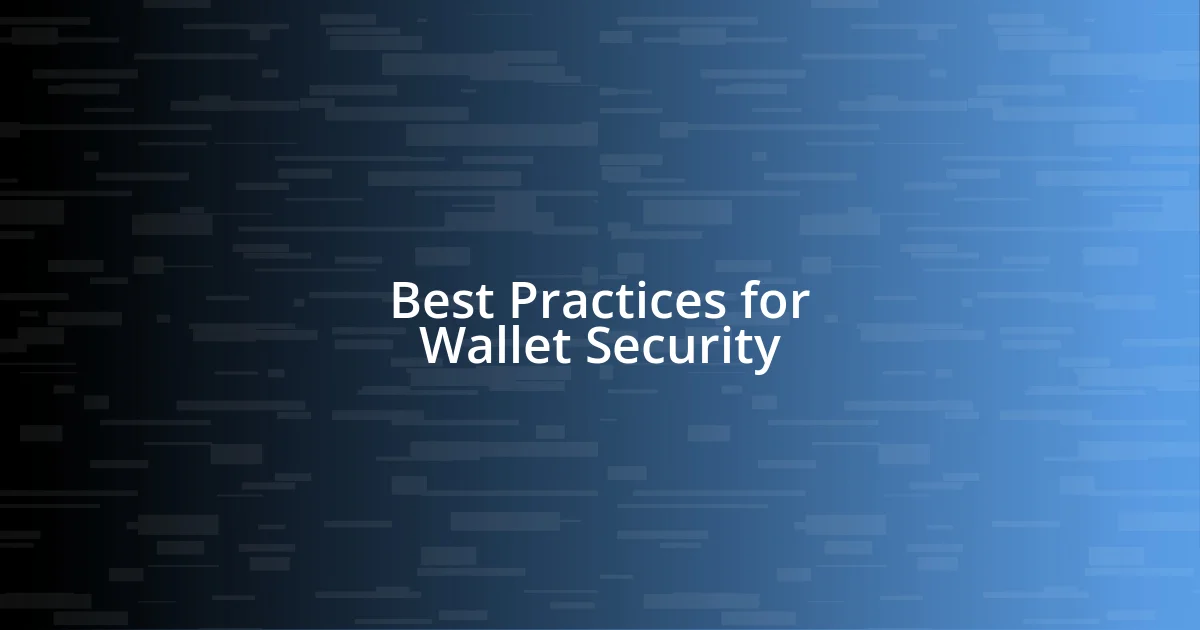
Best Practices for Wallet Security
To maintain wallet security, always use strong, unique passwords for your accounts. I remember the relief I felt after installing a password manager; it relieved the mental burden of keeping track of complex passwords. Additionally, enabling two-factor authentication (2FA) adds an extra layer of protection. Have you ever dealt with the anxiety of realizing a single breach could expose all your funds? With 2FA, I can confidently access my wallet knowing that even if my password is compromised, my assets are still safe.
Regularly updating your wallet software is crucial as well. I learned this the hard way when I noticed an outdated application was vulnerable to attacks. The moment I updated my wallet, I felt empowered, knowing I had taken an essential step to fortify my defenses. It’s a simple practice, yet many overlook it—why risk your investments when a quick update can make such a difference?
Furthermore, always be cautious of phishing attempts. One time, I almost clicked on a suspicious link that promised an amazing new trading feature, only to later discover it was a scam. Trust me, keeping your guard up and verifying sources is vital. It might seem tedious, but wouldn’t you prefer spending a few extra moments to protect potentially significant assets rather than dealing with the aftermath of a theft? Prioritizing wallet security is not just about technology; it’s about cultivating awareness and making informed decisions.
